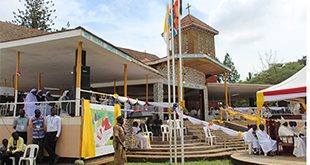
You also happen to be Belgium’s ambassador to South Sudan. How happy are you with recent developments there?
There was a lot of hope the moment South Sudan became independent but then, at the end of 2013, hell broke loose. So the only way forward is to strive for peace, and every effort to reach this has to be commended. The fact that most of the involved parties have signed the agreement makes us hopeful. We, of course, laud Uganda and Sudan for taking the effort to help broker the peace deal in South Sudan.
How does Belgium reconcile the need for peace with the need for punishment of the perpetrators of war crimes and atrocities in South Sudan?
I think one does not exclude the other. I don’t think there can be real peace until those who have committed atrocities are made accountable for their actions. So accountability is important, not only in South Sudan but everywhere in the world.
Looking at the big refugee crisis in the Great Lakes region, it appears that this region is always on fire in terms of political conflict. What explains the eternal conflict in this region?
That is not an easy question. Let me first of all commend Uganda for its response towards refugees. If you look at the current trends in the world, Uganda’s welcoming approach towards refugees is quite unique and we should never forget that. Of course Belgium and other countries have helped Uganda in its refugee response, both in the short term with humanitarian aid and with skills development in the long term, but the most important thing is actually to address the root causes of those conflicts.This is something we have to put emphasis on in our six-monthly dialogues with President Museveni because we do believe that it is not the EU that will solve problems in the region but the political leaders in the region. This is one of the important reasons why we have good relations with Uganda—not only because of our development cooperation programme but also because we always have considered Uganda a very good and reliable partner of Belgium and the EU when it comes to brokering peace in the region.
Going forward, what will be the focus of the Uganda-Belgium cooperation?
Uganda will remain one of our key development partners. I suspect we are not going to leave the education and health sectors since we have developed a lot of expertise in these sectors. But we are also looking at ways of how we can put more emphasis on agriculture since we have a lot of Belgian NGOs and private companies active in this sector.
You have been living and working in Uganda over the last three years. Tell us about your impressions?
My family and I have enjoyed our stay in Uganda very much. We think Uganda is a very beautiful country with a perfect climate. Ugandans are extremely nice and welcoming to foreigners— not only to expatriates but also to refugees. Of course in Kampala, you have problems of pollution and traffic but overall, we are very happy to stay here.
 The Independent Uganda: You get the Truth we Pay the Price
The Independent Uganda: You get the Truth we Pay the Price


